“I wonder if you are myself.”
“Do you enjoy your new life, mon cher?” says the pteranodon, hovering prehistorically in the foyer. “An eternity of darkness, feeding like a beast in ze night on human blood alone!”
She doesn’t say this with her mouth, of course. That is not the pteranodon method. She speaks only in the language of the eyes, and aviation.
It’s not her fault, really; pteranodons aren’t known for their ability to ask sarcastic questions in a French accent. Besides, they only had her up on the wires once, and they’ve used the footage in four different episodes so far. So she doesn’t do lip synch. She just sort of hangs there, and dialogue emanates.
“Feared and reviled by every living creature,” she continues, aerodynamically. “And anyone who dares to love you shall DIE! This ees Angelique’s gift to you, mon cher! Her curse! And no one shall undo eet!” She’s upset, is what she’s trying to say. Angeliques don’t deal with extinction well.
So this is what it’s come to, on Christmas Day 1969. An orange-faced clown with candy corn contacts, looking up in confusion and disbelief as this vision from the late Cretaceous makes fun of him for getting cousin blood on his nose. It’s not everybody’s idea of a holiday special, but it’s the best we can do.
Today’s episode of Dark Shadows was pre-empted so that ABC could bring you some traditional Christmas basketball, and on pre-emption days, we watch another episode of the appropriately ill-fated 1991 Dark Shadows revival series. Here’s the previous episodes, if you want to catch up. We’re currently on episode 10 out of 12, which is plenty of time for the show to start delivering on the romance and thrills that they’ve been promising us. Somebody needs to explain to them that suspending an actress eight feet in the air is not the same thing as suspense.
We’re currently in the 1790s, where governess Victoria Winters finds herself stuck at work two centuries early. Vicki’s currently in lockup on a trumped-up witchcraft charge, while the 18th century Collins family exterminates itself. On the whole, going backwards two hundred years has been a plus for the program, which is getting a belated grip on what it’s trying to do.
But we’re running into a problem that bedevils any adaptation, revival or reboot: how faithful they’re supposed to be to the original source material. Obviously, the new version can’t be a shot-for-shot remake, because otherwise why even bother, but how do you decide what to keep and what to throw away? And in this case, I honestly don’t understand how they’re making that determination.
I mean, you’d think that if there was one thing they’d make sure to keep in the new 1795, it would be Angelique’s curse that turns Barnabas into a vampire. This was one of the great moments of the original story. Barnabas’ fiancee Josette was ensorcelled into a union with his uncle, leaving a marriage-minded Barnabas at the mercy of the sorceress. Angelique set up housekeeping with Barnabas for a blissful couple of weeks, until he realized that she was the author of all his pain, and shot her in the shoulder.
Thinking she was on her way out, Angelique leveled a double-barreled curse at him, as follows:
I set a curse on you, Barnabas Collins! You wanted your Josette so much? Well, you shall have her! But not in the way that you would have chosen. You will never rest, Barnabas… and you will never be able to love anyone… for whoever loves you will die! That is my curse, and you will live with it — through all eternity!
And then the flappy marionette bat came through the window and smacked our hero right in the jugular, turning him into the creature of the night that 16 Magazine readers loved so unwisely and so well.
But that was the old show. In the 1991 version, they thought it would be way more interesting if Barnabas just randomly strangled Angelique to death in the middle of an argument, and dropped her on the floor.
Because then they could have dead Angelique appear to Barnabas ten minutes later pretending to be Josette, who suddenly turned into a Josette vampire and bit Barnabas and then transformed into a flappy bat and flew away.
And then she could deliver the actual curse dialogue halfway through the next episode, while she’s appearing as a non-sound-synched avian reptile, because why burden people with all the compelling dramatic material in one scene when you can smear it awkwardly across several episodes?
So I’m sorry but it is war between 1991 Dark Shadows and me, because this episode is terrible and they have ruined Christmas. It begins with a ten-minute parade of second-tier characters that makes me feel like there is no justice or reason in this vale of tears. They were just getting a handle on the idea of pointing the camera at their most appealing characters while they still have some, but this episode takes that idea back behind the toolshed, and we never see it again.
The evening begins with pop-eyed nonentity Peter Bradford hearing about Barnabas’ tragic death from Josette’s aunt Natalie, and then they go upstairs to Vicki’s room to rummage through her belongings. They look at the Collins Family History that she brought with her from the future, and Peter finds the journal entries that she wrote about how she came back through time.
“Countess, there is no reason to invent such a tale,” he cries, brandishing the pages. “In her present predicament, it only works against her!” Which is fine, except why are we doing book reviews on Vicki’s diary right now? The main character of the show just died in a brutal bat accident.
In fact, there are four main characters — Barnabas, Angelique, Josette and Vicki — and we don’t see any of them for the whole first act. We see Peter and Natalie’s literary salon, Joshua and Andre’s search for the animal that attacked Barnabas, and a family meeting about how they’re going to cover up the death. There’s a nice long scene with Naomi grieving over her dead sons, which would be great if I gave a damn about Naomi.
And then they carry Barnabas’ coffin in the dead of night to hide it in the back room of the Collins mausoleum, and before you know it, it’s the end of the first act, and we’ve burned through ten minutes of prime time with nothing to show for it.
Several scenes into act 2, they finally put a scene together that I would consider worth watching. In the revival, Vicki and Josette are played by the same actress, leading to the following scene, which I respect for its stubborn determination to do the strangest possible thing.
Josette: I told you once before how I seem to know you, as I know myself.
[Vicki nods. Note: I don’t remember Josette ever saying this.]
Josette: Well, now, though my head spins to imagine it, I wonder if you are myself. Myself, in two hundred years.
Vicki: I’ve wondered the same thing.
[Vicki grins, and takes Josette’s hands.]
Vicki: Is it possible?
Josette: I no longer know what that means anymore!
Yeah, that makes three of us. And then, this.
Dead Barnabas bangs on the inside of his coffin until it swings open, revealing him lying inside, shot once again from the perspective of someone looking straight up his nose.
And this, for me, is the moment that just shatters any goodwill the show has earned over the last few episodes. There was a specific directorial choice from the very beginning of the show to shoot Ben Cross from below, in order to make him appear taller and more imposing. I don’t think this works, because it means we’re constantly staring all the way up his nose, which is a perfectly good nose but doesn’t deserve this kind of special treatment.
But now, right now, Barnabas is lying on his back in a coffin. Shooting him with sinus-cam doesn’t make him look bigger; it just seems like the director is really hot for the inside of his nose. Also the contacts, and the hissing.
I do not understand the concept of hissing vampires, and I refuse to try. Werewolves growl and zombies moan, and this is scary because they are essentially unstoppable. If you hear a werewolf growl then you’re basically already dead, and if you hear a zombie coming then there’s probably several dozen all around you.
But a vampire is a guy — a strong, bloodthirsty guy, but still a guy — and alerting you to his presence is not tactically advantageous. A hiss means “stay away,” not “come closer so I can attack you.” A vampire looks and acts like a seductive dude, who flashes his fangs at the last second and hits you with a sneak attack. Hissing is not stealthy.
The remaster isn’t doing his makeup any favors, by the way. I know that TVs and computer screens are better now than they were in 1991, so maybe the white and orange clown of the living dead look played better at the time. But it doesn’t look good now. It looks rotten.
And then he runs from the mausoleum and WHAT ARE YOU DOING WITH YOUR CAPE? Stop playing airplanes! You don’t even know what airplanes are!
Jesus! I should not be giving remedial vampire advice in episode 10. Revival series, you have had plenty of time to think about how to make a vampire look cool. This is not the way!
And then the whole thing just falls to pieces. There’s a lot more sinus-cam and rushing about making random animal noises.
Then he finds Millicent, who is played by Carolyn, and he leaps on her and bites her throat, which she finds terrifying for half a second and then starts making sexy orgasm sounds. This is a really gross rape culture decision based on the idea that women who get raped should just lie back and enjoy themselves, which I had really hoped we’d left back in the present day.
That’s when they do the Angelique pteranodon thing, and then Ben finds Millicent’s bloodstained and sexually satisfied corpse, and after that, they do a long Jack the Ripper sequence where Barnabas attacks a prostitute because why not. And there is literally nothing on screen that we haven’t seen before.
Tomorrow: Death and Taxidermy.
Next pre-emption special:
Time Travel, part 11: Trial’s an Error.
— Danny Horn

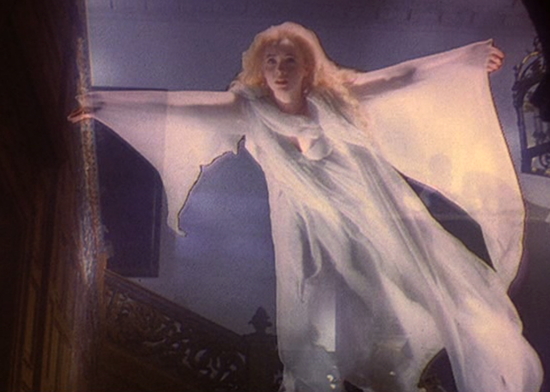
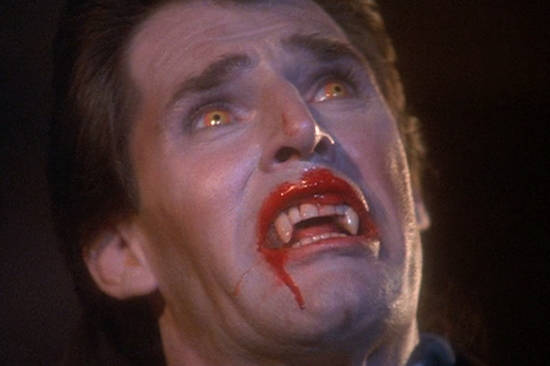
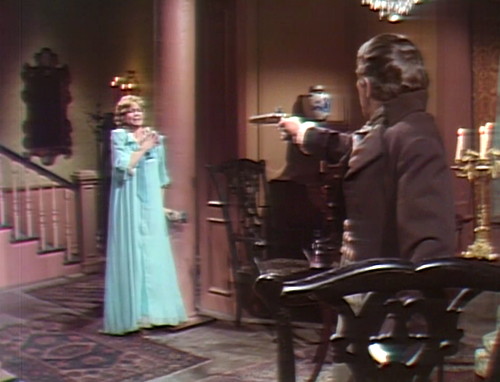
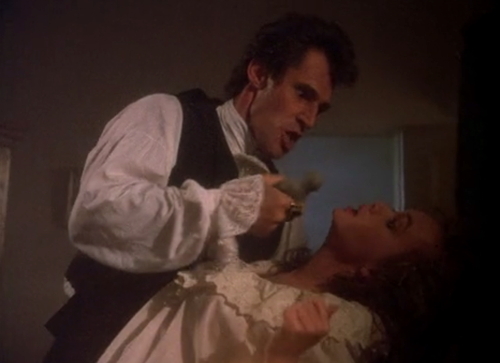
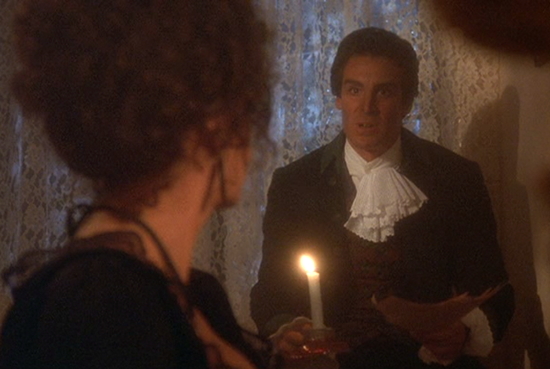
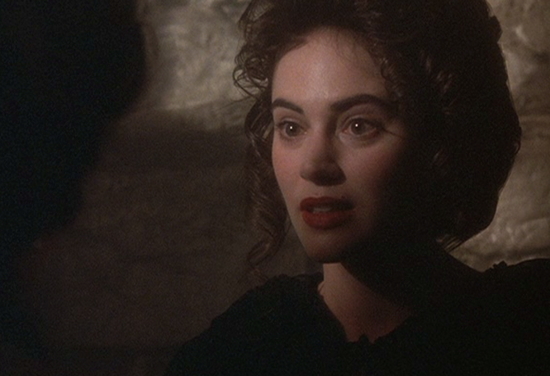
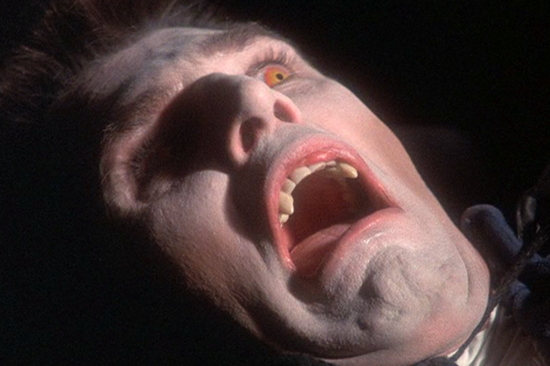
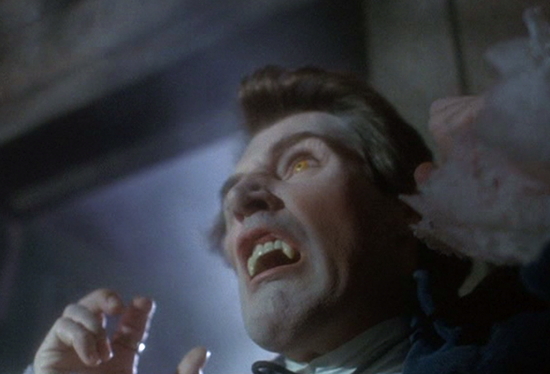
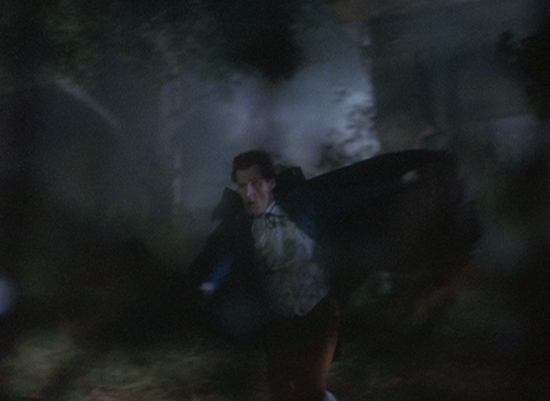
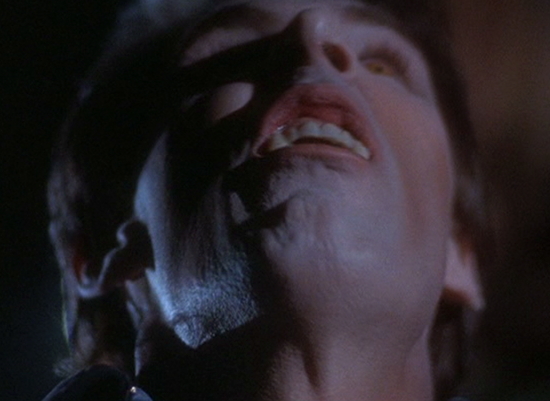

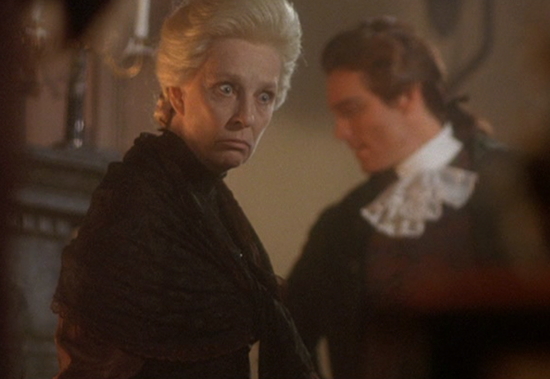
The most frustrating thing about this revival is that it presents you with a genuinely interesting idea (meeting your reincarnation via time-travel) and the show does nothing with it.
The 1991 DS is one long extended version of HOUSE OF DARK SHADOWS, which I can’t imagine why anyone thought was a good idea. I suppose HODS was commercially successful, but it’s a plot-driven gore fest, more Hammer horror than Universal horror. The 1960s series at its best recalled classic Universal in its wit and atmosphere.
However, most damning of the 1991 series is how it fails to be a good soap opera. Soaps are predominately character driven, and even the campy nighttime soaps of the period gave us over-the-top characters and moments (an Army of Grayson Halls). I’ve commented before how Angelique, especially during the 1795 storyline, is Sheila Carter with better politics or Kimberly Shaw without the wig. We’re just 2 years away from Marcia Cross’s first appearance on MELROSE PLACE and yet here we are with a non-engaging Angelique.
There’s also the absence of any real dramatic structure or tension in the revival. Perhaps because it is so plot-driven, it feels like we’re not watching the series through any specific person’s perspective, and as such, we don’t really care what happens. The original 1795 was classic tragedy with a clear focus on Angelique: her goals, her motivations, her frustrations. A key to tragedy is the apparent success of the tragic hero (Macbeth, Richard III). This never happens for the 1991 Angelique, but in 1968, Angelique, through clever and sinister manipulation, winds up Mrs. Barnabas Collins. She’s achieved everything she thought she wanted. It’s highly unsatisfying for an audience to follow a character — even the villain — and only see them fail. No, we need to see them win… and then watch as it all falls apart around them. 1991 DS skips that and eliminates all real tension.
Angelique even has the potential for a “redemption” when she attempts to undo what she’s caused. Either for her own safety or perhaps her own true love for Barnabas, she tries to cure him and later attempts to give him peace. She fails and a greater monster is unleashed. It’s a classic tragedy ending. And if Shakespeare had written sequels, the Barnabas Vampire storyline would be it. It’s also a tragedy but with a sense of redemption as father and son make peace, and the faithful servant is rewarded with freedom. 1991 also chooses to ignore that, as well.
I didn’t notice it at first, but the nosecam did get more and more bizarre. It’s not like making leading men look taller hasn’t been Cinematography 101 since the invention of the movie camera and the apple box.
Regarding the “hissing” vampire, vampire bats certainly don’t hiss — rather, they hypnotize their prey with a prolonged stare, so as to not be swatted away or shaken off while feeding. Bela Lugosi’s Dracula tended to follow that methodology, what with the close-ups on the hypnotic eyes that was always the prelude to a vampiric encounter. The hissing vampire was a product of Christopher Lee and Hammer Films — first in Horror of Dracula when he arrives home to find his “wife” snacking on his librarian guest, Jonathan Harker. Then in Lee’s second Hammer outing as Dracula in 1966 he hissed all the way through, in lieu of dialogue, but probably also to make him seem more feral. The Hammer Dracula films by this time were really stepping up the gore aspect. One thing Dark Shadows took from Horror of Dracula: Recall when Barnabas pays his first nocturnal visit to the bedroom of Maggie Evans and he stands there by the foot of the bed with that wide feral grin as he savors his prey — this was the exact positioning, pose, and expression given by Christopher Lee a decade earlier the very first time he enters the bedroom of a sleeping Lucy Holmwood.
Regarding the 1991 Dark Shadows, or disregarding it as I do to this day, it’s easy to see why younger, new fans are continually picking up on the 1966-1971 Dark Shadows while the DVD set for the 1991 remake remains out of print. I last saw a DVD of the 1991 Dark Shadows, a used copy, in the video section of a local record shop some 4 or 5 years ago. May it rot in piece.
Even more galling, whenever I Google Dark Shadows these days, always at the top of any search is Johnny Depp, with his snarky baby face, as Bratabas Collins. Same with the Google Images setting — you have to wade through the muck before you get to the real Dark Shadows.
I used to admire Depp as an actor, thought he was great as Ed Wood and still have the DVD of that movie. But after what he did to my show, with that snarky “We’re doing things a bit differently” approach, I can say with utter certainty that I’ve seen my last Johnny Dipp flick.
Prisoner of the Night-
I have found when googling anything related to Dark Shadows that it is quite a helpful technique to add to one’s search several negative search terms by placing a (-) minus sign immediately preceding those terms one wishes to avoid seeing ever again.
So, for example, if I wish to find images of the drawing room at Collinwood, but do not wish to be reminded that tomorrow is garbage day, then I would perform a search for “Collinwood drawing room -Depp -Burton -2012”.
By doing it this way, I can prevent most (although not all) of the dreck from the half-baked, huge-budget Burton Depp 2012 film from clogging up my results. This technique also keeps me from constantly hissing (like Ben Cross) as I read through the search results!
Also, thank you so much for the great info about “Dark Passages” by KLS. I wasn’t aware of it. It is much appreciated.
-Count Catofi
And I, Count Catofi, wasn’t aware of this negative search result technique. However, I’m not sure which is worse: having to view those dreadful images of The Burton Atrocity of 2012 or having instead to type again and again the names of those of whom we do not speak. Even if you type in next to “dark shadows” terms like “original TV show” and either “1966” or “1966-1971” Google still serves up as first choices those unsettling forensic crime scenes of The Burton Atrocity. It is my fervent hope that time will take care of things and relieve the perpetrators of their unwarranted Google status relating to all things Dark Shadows.
I’m really enjoying the Dark Passages novel at present. I ordered a hard copy through the U.S. branch of The Book Depository (through which I also acquired an out-of-print copy of the series’ original story bible, Shadows on the Wall, by Art Wallace).
But one element has me confused: the portrayal of Ed McNabb, who portrays the artist father of Margie, obviously based on Sam Evans. In the previous post I thought this was based on Mark Allen, the first actor to play Sam Evans, because he was there on the first day, where that excerpt I posted was set, but now I’m not so sure. Because though both Mark Allen and David Ford could be considered “portly”, the “tweed trilby” look was something we saw from Ford and not Allen. Further, unlike on the actual show, in the novel there is no change of actor to take over the role of Margie’s father — it’s always Ed McNabb, who always reeks of cigarette and liquor fumes even at noontime for rehearsals and is always trying to grab at Morgana’s breasts. And eventually we get to a conversation between Morgana and Ginny Blake, the petite blonde Southern actress who plays the daughter of Mrs. Stanhope in the mansion on the hill, during which Ginny reveals that she really likes McNabb and that she might even marry him. Morgana is taken aback, and wonders what she could ever see in him; Ms. Scott in her prose has Morgana in self-thought refer to McNabb as an “old fart” and an “old fool”.
So it makes me wonder: Who was the old “letch”? Mark Allen or David Ford? Or neither? Or both? Perhaps I’m just reading too much into what is written — but if not, then Ms. Scott has indeed found a way to reveal what she really thinks about certain of her colleagues on the show without getting sued for it. And, of course, both Sam Evans’ are long dead by now, so what’s the difference?
But on its own merits, Dark Passages is fantastically entertaining, and Ms. Scott is a remarkable writer who has managed to bring a refreshing and innovative portrayal of vampire tropes into a scintillating inside view of the Dark Shadows television studios (with many revealing glimpses of where in the studio actual sets were located, what they consisted of, and how certain special effects were done, along with intricate recipes describing several makeup techniques). On the back cover, one of the blurbs is by Jonathan Frid, who writes:
“Reading DARK PASSAGES was like being back on the sets of DARK SHADOWS, except with real vampires behind the scenes!”
Trying to match up Dark Passages with real-life counterparts becomes increasingly pointless. In the novel, after the Dark Passages series has been on TV for several years, KLS writes that the cast and crew were horrified to learn of the assassination of President Kennedy.
This tragedy took place in the real world years before Dark Shadows premiered, but apparently took place in the late 60’s in the DP-verse.
Hmmm… Maybe Dark Passages is set in 1960s PT?
I’m 77% percent through “Dark Passages” (Kindle version) and I’ve given up on drawing lines. As mentioned, if you know a lot about Dark Shadows some of it is tantalizingly familiar but other parts are a head scratcher. Also, something else that happens in the book (no spoiler) happened in 1963.
It’s like we have our own little Dark Shadows book club going. Who’s planning to read Lara Parker’s new DS novel “Heiress of Collinwood” on release in November?
I have the Big Finish audio book Angelique’s Descent (parts 1 and 2), written and performed by Lara Parker. Ms. Parker is also an impressive writer, but with the audio book there is the added advantage of hearing her act out all the parts.
Whereas in Real Life (TM) the Dark Shadows cast might have been horrified to learn of the assassination of Robert Kennedy in 1968.
I think I like the 1960s PT theory best!
Actually, now that I think about it, it’s explicitly stated that the heroine arrives in New York during the Cuban Missile Crisis which sets it squarely at the beginning of the 60s (October 1962, to be precise).
So tempted to get this now! KLS certainly could’ve arrived in New York then, she would’ve been 19 years old. I can’t remember seeing elsewhere if she states what year she came to New York.
I hope that little trick can work for other things, because I’m always looking for something out of the way, and of course running into some hugely famous counterpart of it, and very often it’s really REACHING to call it a counterpart. (If I’m looking for some early TV commercial on YouTube, in spite of the thousands of ones there are, odds are are I’m going to be directed to that Coke commercial with Mean Joe Green and that kid! And that’s one example out of countless ones.) As much as you hate getting a “No Results” kind of answer, that can be like salt in the wound.”
I don’t recall if you mentioned this in an earlier review of the ’91 series, but there are two problems with this DVD version.
One, is that it was transferred without any of the day for night filters they used originally during its NBC broadcast, so every shot taken outside at night (which was shot during daylight) is ridiculously bright.
This is probably causing Ben Cross’s awful vampire make-up look even more ridiculous than it did originally. (Although, as someone who watched it in 1991, the vampire make-up never looked good.)
The other is that the picture, which was shot in the old TV aspect ratio of 4.3:1 was cropped and zoomed in so it will fit on today’s widescreen TV’s.
This has the unfortunate side effect of making close up shots look even more close, which probably isn’t doing Ben Cross’s nose any favors.
They just released ’91 in a new frame ratio last year, though I don’t believe they fixed the day for night.
As a jump off of the hissing commentary, I always thought Frid’s early Barnabas had a lot of Nosferatu-like hand movements. (And I very hope they were intentional).
I love ’91 and all its melodrama, but it lacks any hints of nuance.
And while he didn’t hiss, he did have a tendency to sometimes draw out the final esses of words.
If I had to choose to be bitten by either Jonathan Frid or Ben Cross, I’d go for the latter. Of course I’d really rather being bitten by Michael T. Weiss.
Agreed, though I’d add Adrian Paul.
Can we dream of Vinnie Barbarino shouting at this Barnabas “Up your nose with a rubber hose!”
“…WHAT ARE YOU DOING WITH YOUR CAPE?”
Come on, just try running while wearing a cape, and not flourishing it a bit just for effect.
Go on, try. You can practice with a bedsheet or a beach towel.
It’s like saying, “I am…Count Dracula,” without using a bad Hungarian accent. (“I do NOT say ‘blah bleh blah’!”)
Besides, BC91 just got cursed, he hasn’t got the finer points down yet, and there’s always this camera around, filming up his nose! (Guess Dan Curtis just wants to be SURE those nostrils are clean. Don’t want another shot of Barnabas ‘picking out a good one’, like in the original show.)
This column calls back all my fanboy anticipation and deep disappointment in the ’91 DS. And yes, a lot of it has to do with neglecting the soap element and the richness of characters.
Indulge me here?
I had a whole read on the original 1795 storyline based on how dysfunctional and repressed the Collins family were, bullied by a tyrant father and a hysterical aunt–Naomi insulted, bored, driven to drink, Jeremiah ordered about and essentially driven/drifting into a marriage to an idiot cousin, and Barnabas, the obedient son to a slave-driving martinet, commanded to court a Caribbean heiress for her family’s plantations: in my read (this was based on the closest possible rebellious teenage identification with Barnabas and a few dialogue hints), Barnabas, in the midst of soullessly signing his life over in exchange for sugar plantations and slaves, quite unexpectedly and overwhelmingly fell for Josette, who at first didn’t return his interest. (The Sam Hall dialogue does say that.) This is the whole deal: Barnabas’s unlikely fixation on the happiness he thought Josette would bring him, his own happiness, his own freedom, his own life at last.
The whole characterization, then, was built around an unhappy, frustrated Barnabas’s obsession with Josette, and his furious rage whenever he felt he was losing her. It wasn’t just a love story between two rich kids, but all of Barnabas’s life-frustration and youthful rebellion and self-assertion funneled into this affair.
So everything until the Quentin story spins on Barnabas’s fury when his desire is blocked:
–in Martinique, the heiress is unmoved by his protestations; convinced she’ll never love him, he breaks all the rules in a moment (remember he was raised in a Puritan household) and bitterly, impulsively gets it on with the hot French maid.
When, in correspondence, Josette slowly begins to return Barnabas’s affection, it is like a dream come true, and the one-chance-for-happiness obsession with Josette returns: and then Angelique stirs everything up again, and Barnabas gets increasingly violent:
–Jeremiah takes Josette? Barnabas shoots him in a duel.
–He figures out Angelique was the cause of it all? He shoots her point-blank.
–Angelique kills and curses him? He comes back as a vampire to strangle her and make Josette his vampire bride.
–Josette, choosing not to fulfill that particularly scary love-story, runs away from him and dies (the nightmare that will haunt him for centuries)? He brings her back, against her will, from the dead. (She still says no.)
–Eventually, he, too, comes back from the dead. He finds a girl who looks like her. She’s not Josette? He’ll mind-rape her until she is Josette–but not just the historical Josette who endlessly ran away–a docile, wiling Josette who will come to him.
–Maggie escapes? He’ll consider killing her until he decides not to bother.
–Instead, he’ll seduce Victoria into being Josette. And on, And on.
It all made sense to me as a pattern fueled by emotional desperation and rage, not just a love story, but the saga of a driven, obsessive, dangerous lover who got more mad and dangerous as he gained supernatural powers.
And I said all that so I could say this:
The revival series didn’t get any of that.
In the revival, the affair with Angelique was a weightless, pointless dalliance that came out of nowhere–Ben Cross in an interview compared it to a Fatal Attraction-level hookup that went bad. Well, if the affair didn’t matter, wasn’t driven by anything, then it’s all a kind of accident: this is not the ore of which soap opera gold is mined. Revival Barnabas wasn’t unhappy, repressed, tyrannized and dreaming of unrealistic happiness–he was a kind of Revolutionary-era Kennedy heir, all good looks. good luck, and money. He had it made, and there was no way to feel about the affair with Angelique except that he just shouldn’t have made such an obvious mistake.
Of course, as noted, in the revival they use sex scenes instead of taking the trouble to write relationships, which keeps Barnabas’s emotions and character nice and shallow.
No one else gets a scrap of characterization, either: at the first, Lara Parker wasn’t nearly the actress Lysette Anthony was, but she played an Angelique with a complicating streak of pathos and what she thought was genuine love, even seeking marriage with Barnabas–Anthony, in interviews, kept chortling about Angelique as “sexually obsessed.” Oy. The surrounding characters are all blanks–poor Jean Simmons!–so the Barnabas-Josette romance has no emotional context or resonance. Tyrant Jeremiah, abused alcoholic Naomi, drifting and lonely Jeremiah, bitter and victimized Ben Stokes, are all replaced by nothing very much. The lack of personality on all sides is fatal.
Deprived of his obstacles, which fuel an outsize, unreasonable passion, Barnabas’s rage (for which his vampirism in ultimately a metaphor) is short-changed, his actions become tepid, and the whole thing becomes forgettable. Revival Barnabas doesn’t make one powerful choice! I guess they were trying to make Barnabas more sympathetic (or to counter Ben Cross’s ice-cold performance), but it all comes out beige. This episode makes it so clear:
–where Frid’s Barnabas, in revenge, coldly shot Jeremiah without forgiveness, Cross’s is made to apologize and to go through the duel without a bullet–so moaning, thrashing Angelique is suddenly the sole driver of the story, stealing from Barnabas his role as co-author of his own tragedy.
–The original Barnabas shot Angelique in cold blood–Cross’s just defends himself from her (completely out-of-character) knife attack and she falls accidentally on her own blade–whoops!
–As for forcing Josette back from the dead, or
–mind-raping a Collinsport girl into becoming a docile version of his obsession-object–that got cut. Never mind.
They ended up neutering (de-fanging?) their protagonist and scattering the landscape with ciphers.The original characters had arcs: Jeremiah discovering an undetected, heartbroken love for Naomi and Barnabas, Naomi standing up to Jeremiah to defend Barnabas’s marriage, Ben Stokes’ heroic devotion to Barnabas after death, Barnabas’s progression from naive and tormented son to dominating monster.
Not here.
So much insult to the viewers and the fans, to believe that bigger sets and a bigger budget and more blood and more sex scenes and Angelique as a screaming spook was all that they would want. Even on a rushed schedule, you can cram interesting characterizing details into dialogue and give supporting actors interesting things to do and create an emotional world in which all this magic arises.
Well done, MichaelE! I wanted so much to like the revival. You explain its failure, contrasted with the strengths of the original, very well.
thank you, Michael E. the heartfelt depth and respect for intelligence illumined here quite do me in. seven hearts, plus three.
“But we’re running into a problem that bedevils any adaptation, revival or reboot: how faithful they’re supposed to be to the original source material.” With the idea of a revival of something as vast as Dark Shadows, you also have to decide which parts of the source material to focus on. If you’re making a weekly primetime soap I think you’d start with the 1897 segment- that’s the one part of the show where you have a whole bunch of overlapping, intertwining stories that all work and that all feature characters who have enough substance that they could be repurposed to other actors and other acting styles.
If you’re making a grand opera, 1795 is the place to go. You build it around the big, hyper-emotional moments- Barnabas falls out with his great love and his best friend and is left an angry, isolated figure, Barnabas is cursed and becomes a vampire, Joshua chains the coffin and Barnabas becomes a blight for the future.
If you’re doing a feature, I think the early planning for HOUSE OF DARK SHADOWS had a good idea- build it around David. The year after that movie came out, HAROLD AND MAUDE would gain a cult following with its story of a disturbed teenager from a rich, isolated family who repeatedly fakes suicide and torments others, but who finds a new way of relating to the world through his friendship with a much older woman. The original idea for HODS was that David would repeatedly fake suicide and torment others. So, you could have him start off that way, then get a new governess who sets out to save him from himself. She finds a new side to his personality and they become friends while a mysterious cousin from England settles in the old house on the estate. David sounds warnings about the mysterious cousin which the other adults ignore, but the governess has learned to trust him. She sets out to rescue him from the cousin as she had rescued him from his illness, but in the end it is David who must rescue her, at great cost to his mental health. That would set you up for a sequel, set sometime after David comes home from the loony bin.